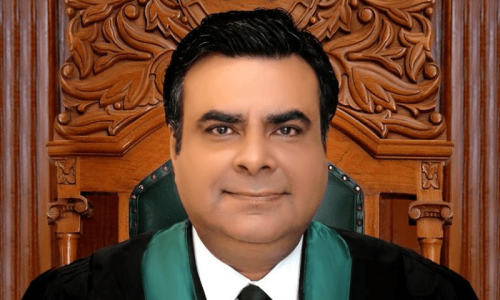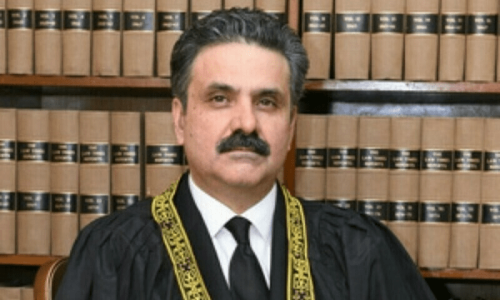ISLAMABAD, Jan 15: The participants of a seminar on Monday were unanimous in their views that free and fair elections could not be possible under Gen Pervez Musharraf and called for setting up of a national consensus-based caretaker government in order to restore real democracy in Pakistan.
Speaking at a seminar on “Is a free and fair election possible in Pakistan?”, organised by the Sustainable Development Policy Institute (SDPI), politicians from two major opposition parties and representatives of civil society organisations warned that the country could face a 1971-like situation if transparent elections were not held in Pakistan. They feared that such a situation was likely to happen under the government led by Gen Musharraf.
Alliance for the Restoration of Democracy (ARD) secretary- general Iqbal Zafar Jhagra said the way the government was making preparations for the next elections clearly suggested that the coming polls would be the most rigged ones in the country history.
He criticised Gen Musharraf for patronising the ruling Pakistan Muslim League and said: “Unfortunately, an unelected president is manipulating the political process to create a favourable environment for the king’s party.”
Mr Jhagra also read out the excerpts from the European Union parliament’s resolution which pointed out serious flaws in the elections 2002 and the presidential referendum, held in April 2002. He said the time had come that they should decide once for all, whether the country would be ruled by its people or by the generals.
A representative of the People’s Party Parliamentarians (PPP) B.A. Malik asked the nation to forget about the possibility of free and fair elections, if Gen Musharraf continued to stay in power.
He regretted that the institutions had been destroyed, election commission could not stand up and judiciary had been generous in legitimising the military takeovers, while the people of Pakistan had never been given a chance to elect their representatives.
He said Gen Musharraf called the upcoming polls as the mother of all elections and the opposition believed that it would be the mother of all riggings.
Mr Malik said the establishment, led by Pakistan Army, had never allowed space to any institution or stakeholders, like voters, election commission and judiciary in the election.
“A country cannot have democratic process if a government servant in military uniform is sitting at the top of the system.” He said the PPP had been at war with the army-led establishment since 1967 when the party was formed by Zulfiqar Ali Bhutto.
He said the establishment had transferred power to Mr Bhutto in 1972 because it was humiliated due to fall of Dhaka. However, he said, later it hanged Mr Bhutto when he tried to establish civilian supremacy.
Mr Malik categorically announced that the PPP would take part in the next elections at all costs.
He said Gen Musharraf was instigating the opposition parties to announce boycott of the elections, but the opposition would not give a free hand and an open field to the military regime.
He said the politicians had the right to commit mistakes and correct them. He said when politicians committed mistakes, army committed treason.
Executive director of Pakistan Institute of Legislative Development and Transparency (Pildat) Ahmed Bilal Mehboob identified five major stake-holders in the elections which were people or voters, political parties, the government of the day, election commission and judiciary.
He was of the view that free and fair polls were possible in the country, if one of the stake-holders got ready to fulfil its responsibility.
However, he was also of the view that the way the things were moving, there were no signs that the next elections would be held in a free and fair manner.
He was of the view that the people had no trust and interest in the electoral process which was evident from the fact that Pakistan had the lowest turnout rate in the elections in whole South Asia.
Moreover, he said, according to a study only 21 per cent of the voters believed that elections were held freely in Pakistan.
Mr Mehboob said political parties were disorganised and the present government’s and president’s neutrality regarding conducting free and fair polls was questionable.
He asked the political parties to work for increasing the level of trust of the people in the electoral process and arrange trainings for their workers to appoint them as polling agents in the next elections.
He said the ECP had the powers and the laws to ensure free and fair polls, but it was yet to be seen whether the chief election commissioner would be able to exercise his powers and authority in this regard.
Mr Mehboob also called for an independent and strong judiciary to ensure free and fair polls in the country. He said that under the laws, the judiciary was required to dispose of the election petitions in 120 days, but unfortunately cases were kept lingering even till the next general elections.
During the question-answer session, the participants raised questions about the future strategy of the political parties regarding the polls and to oust the army from politics on permanent basis.
Both the PPP and the PML-N leaders said that their parties had decided to mobilise the masses.
Mr Jhagra said that PML-N chief Nawaz Sharif was planning a multi-party conference in London so that the opposition parties could chalk out a programme and strategy for the next polls from a united platform.















































Dear visitor, the comments section is undergoing an overhaul and will return soon.